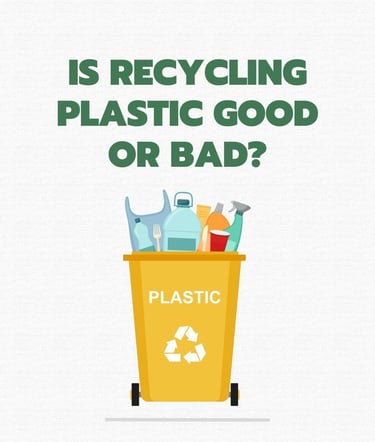Plastic Recycling Isn’t the Hero We Thought It Was — So What Now?
5/19/20253 min read


For those of you who know me, you know there are few things I hate more than seeing trash all over the ground - on the streets, trails, rivers, beaches...its disgusting! And I often wonder what kind of person does this.
On a recent vacation in Mexico, I saw something I can’t unsee: plastic bottles everywhere. Resorts often avoid serving tap water, so bottled water becomes the norm for tourists. But here's the thing — for all the water bottles I saw being used, I saw zero recycling bins.
And it got me thinking… where did all those bottles go?
Probably not into a recycling plant.
The Truth About Plastic Recycling
We’ve all been trained to look for the little ♻️ symbol on plastic and feel good about tossing it in a blue bin. But here’s the rough truth: most plastic doesn’t actually get recycled.
That “recyclable” symbol? It was part of a strategy by the plastics industry to make consumers (aka us) feel responsible for managing plastic waste, not the people making it. According to a Greenpeace report, only about 5% of plastic actually gets recycled. Let that sink in.
And what’s worse? Some of the recycled plastic actually ends up being more toxic.
A 2024 study found dangerous flame retardants — banned in many places — turning up in recycled kitchen utensils, takeout trays, and even kids' toys. Why? Because plastics from electronics and other toxic sources often get thrown into the recycling mix.
So if you’ve got black plastic utensils or food containers, it’s a good time to toss those.
What’s the Deal in the Caribbean?
Many Caribbean countries have some kind of minimal recycling initiatives, but infrastructure and enforcement vary from island to island. All countries have a significant opportunity for improvement. And even IF plastic is recycled and collected here, then what?
Barbados
The Sanitation Service Authority (SSA) encourages sorting and recycling through drop-off depots.
Plastic bottle redemption programs exist in some areas.
Jamaica
Recycling Partners of Jamaica collects PET bottles, especially from schools and businesses.
Still, many areas don’t have curbside recycling or reliable pickup.
Trinidad & Tobago
The EMA (Environmental Management Authority) has a national beverage container deposit proposal, which was first introduced in 2012 and is still under debate in parliament
A few NGOs run some recycling education and drop-off points, but nothing comprehensive or enforceable
Puerto Rico
In 2022, a law was passed to prohibit the sale, distribution, and use of single-use plastics in commercial establishments, going into effect June 2024. However, there was no true enforcement and in January 2025, a moratorium on commercial enforcement was imposed until July 2025.
Saint Lucia, Dominica and others
Most rely on small-scale or community-led recycling programs.
Collection is inconsistent, and then the plastic needs to be baled and shipped off to be repurposed
So yes, limited opportunities for recycling exist, but it’s not enough to make any kind of impact, especially when global plastic production just keeps growing.
So, What Should We Do?
It comes down to this: 1. Reduce your use! 2. Reuse what you can (but don't reuse single use plastic bottles - they are not made for this). And recycle only what actually can be recycled (mostly clean PET bottles and HDPE plastics).
Here’s how we can start cutting back in our daily lives
✅ Use a refillable stainless steel or glass water bottle (easy to refill at home or with filtered water)
✅ Ditch single-use straws, forks, and containers — carry a reusable set of utensils or ask your favorite food spot if you can bring your own container
✅ Choose glass bottles for drinks and condiments where possible — especially at the supermarket
✅ Switch to resable bags instead of taking plastic every time - leave a few in your car
✅ Store food in glass jars or containers instead of cling wrap and plastic boxes
✅ At home, replace black plastic kitchen tools with wood, stainless steel, or silicone
Not only do these changes help the planet, but they reduce your exposure to microplastics and toxins in food and water. That’s a win-win.
Its clear that plastic recycling is not the magic fix that many people think it is. It’s a backup plan that barely works. The real power is in how we consume and the awareness of the reality of this situation.
What small changes have you made to reduce plastic in your life? Let’s swap tips — and keep each other inspired.
